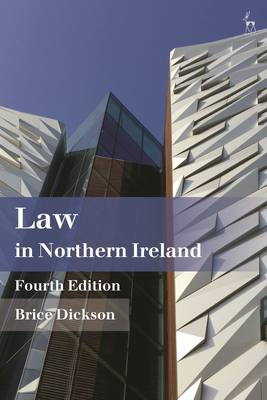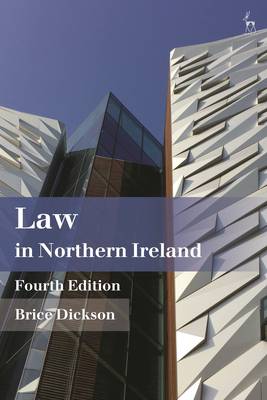
- Retrait gratuit dans votre magasin Club
- 7.000.000 titres dans notre catalogue
- Payer en toute sécurité
- Toujours un magasin près de chez vous
- Retrait gratuit dans votre magasin Club
- 7.000.0000 titres dans notre catalogue
- Payer en toute sécurité
- Toujours un magasin près de chez vous
Description
This textbook presents an engaging and thorough examination of the law in Northern Ireland.
It guides students through the evolution of law-making, the legislative process, courts, and case law and presents a clear overview of the fundamental rules and principles of international law, public law, criminal law, and private law. It contextualises the myriad legal institutions operating in the jurisdiction, sets out how criminal and civil proceedings work in practice, and provides useful information on how people become lawyers, what lawyers actually do once they become qualified, and how the legal system is funded. The appendices set out sample sources of law so that readers can familiarise themselves with what is involved in handling legal documents. This edition has been updated following recent legal developments in Northern Ireland including the 'New Decade, New Approach' agreement of 2020 and the different elements of the power-sharing government, such as the proposed Languages Bill and the Northern Ireland (Ministers, Elections and Petitions of Concern) Bill. It explains the effect of Brexit, in particular the new concept of 'retained EU law' and the effect of the Ireland / Northern Ireland Protocol to the EU-UK Withdrawal Agreement. Setting out the implications of the recent UK-wide reviews of administrative law and the Human Rights Act for Northern Ireland, the book examines the work of the shadow Civil Justice Council and Family Justice Board and looks at the latest developments in the reform of abortion law. It explores new Assembly legislation that addresses the use of committal proceedings in criminal cases, the protection afforded to victims of domestic violence, and the rights of other victims, for example in relation to compensation for victims and survivors of the troubles and the appointment of an interim Victims of Crime Commissioner.Spécifications
Parties prenantes
- Auteur(s) :
- Editeur:
Contenu
- Nombre de pages :
- 536
- Langue:
- Anglais
Caractéristiques
- EAN:
- 9781509961207
- Date de parution :
- 11-08-23
- Format:
- Livre broché
- Format numérique:
- Trade paperback (VS)
- Dimensions :
- 156 mm x 234 mm
- Poids :
- 734 g

Les avis
Nous publions uniquement les avis qui respectent les conditions requises. Consultez nos conditions pour les avis.






